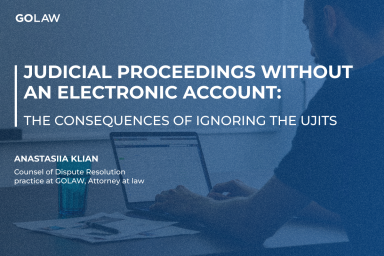Diia City regime in Ukraine: opportunities for IT business
Contents
Since Ukraine in last years paid considerable attention to the development of the digital economy, one of the outcomes of this process was the launch in February 2022 of the unique legal and tax regime of Diia City for the companies operating in the IT sector.
It provides special conditions and guarantees for participants of this regime (residents of Diia City), preferential alternative taxation mechanisms, an additional form of civil law contract (gig-contract) which can be concluded with specialists, and other pros.
Diia City was introduced in Ukraine for an unlimited period but not less than 25 years after registration of the first participant in a special Diia City register.
Since its launch in February 2022, several international IT businesses with a presence in Ukraine have already joined Diia City. Considering the high interest in Diia City, particularly among foreign investors, this material aims to highlight key points and features of this regime.
Who is a resident of Diia City and what requirements must be met to acquire and keep such status?
The general legal framework of the Diia City regime is established by the Law of Ukraine No. 1667 «On stimulating the development of the digital economy in Ukraine» (hereinafter – «Law No. 1667»).
Following the Law No. 1667, the status of Diia City resident can be obtained on an application basis.
The Law No. 1667 defines that the resident of Diia City shall be a legal entity registered on the territory of Ukraine under the procedure established by the legislation of Ukraine, regardless of its location and place of business activity. That is, foreign IT companies that want to take advantage of Diia City must register a legal entity in Ukraine.
To become a resident of Diia City, such a Ukrainian legal entity shall carry out one or more types of IT activities defined by the Law No. 1667. Among them, for instance, are the development, testing, and publishing of software (including computer games), data processing and related activities, educational activities in the field of information technologies, activities of organizers of cyber sports competitions, cyber security, activities of a provider of services related to the circulation of virtual assets, development, implementation and technical support of products and solutions of international card payment systems, activities in the field of robotics.
In addition, to be in the status of Diia City resident, a legal entity shall constantly comply with the following criteria:
- The size of the average monthly remuneration of its employees and gig-specialists (specialists involved based on gig-contracts) must be at least the equivalent of 1,200 euros (starting from the month following the month of obtaining the Diia City residency).
- The average registered number of its employees and gig-specialists (in case of involvement) shall be at least nine people (starting from the month following the month of obtaining the Diia City residency).
- The amount of its net income from the sale of products, services, and royalties received as a result of the IT activities defined above must not be less than 90 % of the amount of the total income of such a legal entity (there are requirements for the first three months of Diia City residency and also for each year of residency).
It is worth noting that the application of these requirements has some specificity in connection with martial law currently effective in Ukraine. Namely, within the period of martial law and till the 1st day of the month following the month of termination of martial law, there is a possibility of not losing Diia City residency if such requirements are not fully met.
In addition, Diia City proposes an option of special participation for start-ups. If a legal entity does not meet the requirements regarding the average monthly salary and the average number of employees, it has the temporary right to be a resident of Diia City, subject to the fulfillment of certain other conditions. At the same time, such a legal entity will not be able to take advantage of all the tax advantages of the Diia City regime. Such relaxations effectively allow promising startups to take advantage of Diia City’s regime «in advance» with the subsequent need to fully meet regime requirements.
Also, the Law No. 1667 defines the characteristics of legal entities that cannot be residents of Diia City. Among them are legal entities that have the status of non-profit, bankrupt, legal entities that have a significant tax debt, that are in the status of termination, and others.
Tax benefits of Diia City regime
The peculiarities of taxation of Diia City residents are implemented in the Tax Code of Ukraine (hereinafter – “Tax Code”) by a separate Law of Ukraine No. 1946 «On amendments to the Tax Code of Ukraine and other laws of Ukraine on stimulating the development of the digital economy in Ukraine».
Income tax
For residents of Diia City, there are two alternative methods of taxation with income tax.
The first method assumes that a resident of Diia City can be a payer of income tax on a general basis, to wit, at a rate of 18%. In this case, the object of taxation will be income with a source of origin in Ukraine and outside of Ukraine (accounting financial result, under certain conditions adjusted for tax differences).
However, the second method, which offers special conditions for taxation with income tax, is considered the main advantage of this regime. Thus, for residents of Diia City that are «taxpayers under special conditions» the rate is set at 9 %, and not on the entire financial result, but on certain operations defined by the Tax Code that are related to the withdrawal of capital. These may include, among other things, payments of dividends and royalties, free-of-charge transfers of goods, works, and services, payments of financial assistance, payments in favor of a non-resident, transfers to the accounts of the Diia City resident itself, which are located abroad, etc. The Tax Code establishes the particular rules for each type of taxable operation – what is the basis of taxation, what are the exclusions from this operation, and others.
Therefore, the advantage of the second method of taxation may lie not only in a halved income tax rate but also in a limited range of taxable transactions.
Still, despite using special tax conditions by Diia City residents, there are separate cases when the income tax rate is 18%. The adjusted income of the controlled foreign company of such Diia City residents is taxable this way. Also, the rate of 18% can be applicable in the event of performance by such residents of controlled operations that do not comply with the arm`s length principle.
Taxation of the income of Diia City resident specialists
To comment on the issue of taxation of the income of Diia City resident specialists, it is first necessary to briefly reveal the forms of their involvement.
Diia City residents can engage specialists in a few different ways.
The first option is establishing labor relations, in other words, the involvement of employees.
One more, second way, is the involvement of individual entrepreneurs, usually those who pay a single tax (hereinafter – «IE»), based on a civil law contract on the provision of services, performance of works, etc. The involvement of IEs can be called preferred by IT companies form of cooperation due to the relatively low tax burden. On the other hand, this form of cooperation may entail a lack of transparency, tax, and other risks, in particular, since the involvement of IEs under certain conditions can be qualified by supervisory authorities as a hidden labor relationship leading to the assessment of additional taxes and fines to the company.
Due to several reasons, Diia City intends and provides for some tools to essentially minimize the cooperation of its residents with IEs.
As an alternative to the above-mentioned formats of involvements, the legal regime of Diia City offers a third unique form of cooperation – the involvement of gig-specialists, i.e. natural persons who perform work and/or provide services to a resident of Diia City under special civil law contracts (gig-contracts). This form of cooperation can be considered fully transparent compared with the involvement of the IE.
Considering the above, we will stop in more detail on tax issues in case of the involvement of employees and gig-specialists.
A resident of Diia City, as a tax agent, when paying income in the form of wages, remuneration under a gig-contract, other payments, and rewards accrued in connection with employment relations or in connection with the performance of a gig-contract, shall tax such payments with personal income tax at a reduced rate of 5%. The author’s remuneration for the creation of service work and the transfer of rights to service works are taxed at the same rate. Whilst, in cases where the amount of the above-mentioned payments per specialist will exceed the equivalent of 240,000 euros per calendar year, the excess amount will be taxed at the usual rate of 18%. Such excess amount shall be declared and taxed by the specialist.
Diia City residents that have temporarily acquired such status (start-ups) are required to tax the above income with personal income tax at the rate of 18%.
Also, the above-mentioned incomes are subject to a military levy at the rate of 1.5%.
One more charge subject to payment by Diia City residents is a single social contribution. There are also reliefs for Diia City residents. Namely, they pay a single social contribution on the amount of wages charged to each employee, remuneration charged to each gig-contractor in the amount of only 22% of the official state minimum wage. That is, the amount of a single social contribution per person for the charged income is about USD 40.00. The entire amount of wages/remuneration charged does not influence the calculation of the sum of a single social contribution (unlike some other cases, not with Diia City residents).
It should be noted that Diia City residents with temporary residential status (start-ups) are limited in benefitting from such single social contribution relief.
Other tax preferences
There are some special rules related to the taxation of dividends payable to natural persons by a resident of Diia City applying special conditions of taxation. The dividends will not be subject to personal income tax or military levy, provided that the stated resident did not pay dividends on shares or other corporate rights during two consecutive calendar years.
Also, there is a right for natural persons to reduce their annual income in the form of dividends for further personal income tax application by the amount of cost of acquiring corporate rights of a start-up Diia City resident (the so-called tax discount).
In summary, Diia City provides several tax advantages and attractive tax conditions. At the same time, it is worth assessing the tax benefits of this regime for the company in each individual case – taking into consideration its activities, scope of transactions, business plans, and other internal matters.
The main non-tax benefits of Diia City resident status
Among the non-tax advantages for Diia City residents, it is worth highlighting the possibility of a Diia City resident protecting sensitive information by concluding an agreement on the non-disclosure of commercial secrets and/or other confidential information. In addition, it is possible to conclude an agreement on refraining from competitive actions. The essential terms and other details of these agreements, as well as the possibility of providing compensation for their violations, are regulated by the Law No. 1667.
Also, an agreement to which a resident of Diia City is a party or an agreement regarding a share in the authorized capital of a resident of Diia City may provide for a list of assurances provided by the party or parties regarding the circumstances that are important for the conclusion, performance or termination of such an agreement. It is possible to include in such contracts a provision that for providing false assurances intentionally or negligently, the guilty party must pay compensation or penalty to the party who relied on such assurances, regardless of the obligation to compensate for damages caused to it or third parties provided for in the contract in connection with the falsity of such assurances.
The list of non-tax benefits is not limited to the above-mentioned. Diia City attracts investment using such instruments as convertible loans, options, and compensation to investors in case of termination or insolvency of the company (liquidation preferences).
If you have questions regarding starting a business in Ukraine, feel free to address GOLAW lawyers. Our experienced team of legal professionals is well-equipped to provide comprehensive assistance and guidance in navigating the complexities of the Ukrainian business landscape.
Whether you need advice on legal regulations, company registration, tax matters, contractual agreements, or any other business-related issues, GOLAW is here to support you every step of the way.

Viktoriia Bublichenko
Partner, Head of Tax, Restructuring, Claims and Recoveries practice, Attorney at law
- Contacts
- 31/33 Kniaziv Ostrozkykh St, Zorianyi Business Center, Kyiv, Ukraine, 01010
- v.bublichenko@golaw.ua
- +38 044 581 1220
- Recognitions
- IFLR1000 2024
- IFLR1000 2024
- ITR World Tax 2025
Sign up to be aware
New achievements are inspired by information. GO further, don’t miss out GOLAW news and legal alerts
Our expertise
-
- Antitrust and Competition
- Banking and Finance
- Compliance, Corporate Governance and Risk Management
- Corporate and M&A
- Criminal and White Collar Defence
- Defense in Anti-corruption procedures and regulations
- Labor and Employment
- Natural Resources and Environment
- Government Relations (GR)
- Insolvency and Corporate Recovery
- Intellectual property
- International trade
- Legal support of business and private Сlients in Germany
- Litigation and dispute resolution
- Private clients
- Real Estate and Construction
- Energy and Natural Resources
- Restructuring, Claims and Recoveries
- Martial Law
- Tax and Customs
-
- Agribusiness
- Aviation
- Chemical industry
- Engineering, Construction and Building Materials
- Natural Resources and Environment
- Financial institutions
- IT and AI
- Industry and manufacturing
- Healthcare industries, Life sciences and Pharmaceuticals
- Media, Entertainment, Sports and Gambling
- Retail, FMCG and E-Commerce
- Transport and Logistics
We use cookies to improve performance of our website and your user experience.
Cookies policy
Cookies settings







